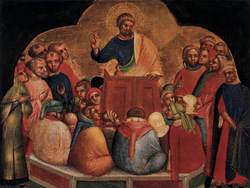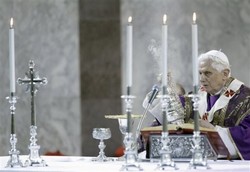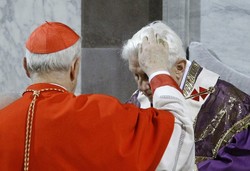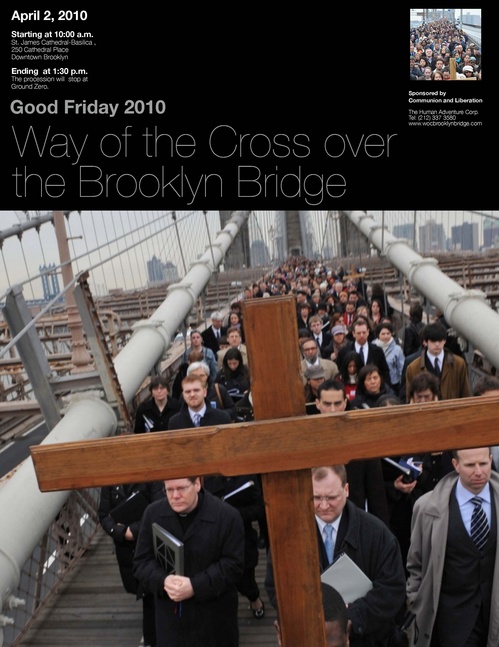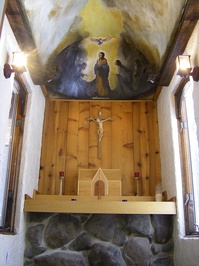The teaching of truth was in his mouth, and no wrong was found on his lips. he walked with me in peace and justice, and turned many away from wickedness.
Matteo Ricci on tract for sainthood?
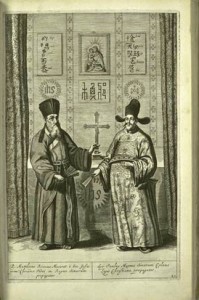 This is old news by now, but the Agenzia Fides reported back in late January that the cause for canonization for Father Matteo Ricci is again active. Ricci always held a special place in my imagination partly because he was (and continues to be) maligned by ideologues. I noted Ricci’s 400th anniversary on this blog back in May.
This is old news by now, but the Agenzia Fides reported back in late January that the cause for canonization for Father Matteo Ricci is again active. Ricci always held a special place in my imagination partly because he was (and continues to be) maligned by ideologues. I noted Ricci’s 400th anniversary on this blog back in May.
The sainthood cause for 16th-century Jesuit missionary Matteo Ricci was reopened on January 24, following Mass at the Cathedral of San Giuliano in the diocese of Diocese of Macerata-Tolentino-Recanati-Cingoli-Treia, where he was born.
The process of beatification originally launched in 1984 when he was named a Servant of God. Bishop Claudio Giuliodori of Macerata said that although the cause stalled soon after it was opened, “these 25 years have not passed in vain because the Lord has given us clear signs of a deeper understanding of the prophetic intuitions of Father Matteo Ricci.”
Father Matteo Ricci was born in 1552 in the Marche town of Macerata. He entered the Society of Jesus and was missioned by his superiors to study mathematics and astronomy before leaving for the Far East at the age of 26.
Ricci’s itinerary included four years in Goa (west coast of India) before traveling to China. On mainland China he settled in Zhao Qing in the southernmost Guangdong Province; he was proficient in studying Chinese. During his time there he produced his global “Great Map of Ten Thousand Countries,” which revolutionized the Chinese understanding of the rest of the world. A copy of the map is on display at the United States Library of Congress.
In 1589 Father Ricci moved to Zhao Zhou and began sharing European mathematical discoveries with Chinese scholars. He became known as “Li Madou” and was renowned for his extraordinary memory and knowledge of astronomy. He eventually became a member of the court of Ming Emperor Wanli.
In 1601 he was allowed into the Forbidden City of Beijing, where he worked until his death in 1610.
Ricci’s postulator (the person promoting the inquiry for the sainthood) is Jesuit Father Anthony Witwer, who is coordinating and supervising a historical commission that has been established to collect all the writings and documents attributed to Father Ricci, along with those that reference him in publication. The commission’s work will conclude with a critical study on the writings of Matteo Ricci along with a judgment as to the authenticity and value of documents on him.
In a message to the Diocese of Macerata inaugurating commemorations of the 400th anniversary of Father Ricci’s death in Beijing in 1610, Pope Benedict XVI wrote that Father Ricci was “gifted with profound faith and extraordinary cultural and academic genius.” He “dedicated long years of his life to weaving a profound dialogue between West and East, at the same time working incisively to root the Gospel in the culture of the great people of China. Even today, his example remains as a model of fruitful encounter between European and Chinese civilization. In considering his intense academic and spiritual activity, we cannot but remain favorably impressed by the innovative and unusual skill with which he, with full respect, approached Chinese cultural and spiritual traditions. It was, in fact, this approach that characterized his mission, which aimed to seek possible harmony between the noble and millennial Chinese civilization and the novelty of Christianity, which is for all societies a ferment of liberation and of true renewal from within, because the Gospel, universal message of salvation, is destined for all men and women whatever the cultural and religious context to which they belong.”
The Pope continued, “What made his apostolate original and, we could say, prophetic, was the profound sympathy he nourished for the Chinese, for their cultures and religious traditions.” Ricci was likewise “a model of dialogue and respect for the beliefs of others and made friendship the style of his apostolate during his twenty-eight years in China.”
History shows us that Ricci remained faithful to this style of evangelization to the end of his life. He made the gospel accessible to people, especially the intellectual classes by “using a scientific methodology and a pastoral strategy based, on the one hand, on respect for the wholesome customs of the place, which Chinese neophytes did not have to abandon when they embraced the Christian faith and, on the other, on his awareness that the Revelation could enhance and complete” those customs. As the Fathers of the Church did in the time of the encounter between the Gospel and Greco-Roman culture, the author of the “Treatise on Friendship” undertook his “farsighted work of inculturation of Christianity in China by seeking constant understanding with the wise men of that country.”
The concluded his anniversary remarks by saying that we, “Following his example, may our own communities, which accommodate people from different cultures and religions, grow in a spirit of acceptance and of reciprocal respect.”
Anthony E. Clark’s article “Weaving a Profound Dialogue between West and East”: On Matteo Ricci, S.J., for Ignatius Insight is helpful for a much broader perspective. Plus, Scranton University hosts a blog entry on Father Ricci that shows a bit his depth of character that you may find interesting.
Blessed John of Fiesole –Fra Angelico
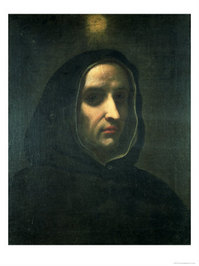 O Lord, teach me your way that I may walk in your truth; direct my heart that I may fear your name. I will give thanks to you with all my heart, O Lord my God, and I will glorify your name forever.
O Lord, teach me your way that I may walk in your truth; direct my heart that I may fear your name. I will give thanks to you with all my heart, O Lord my God, and I will glorify your name forever.
God of eternal beauty, you inspired Fra Angelico as an artist at the service of your truth. May we delight in the beauty of his work and rejoice in the glory of your creation.
Blessed John of Fiesole, known in history as a Blessed Angelico has captured the Catholic and human imagination generations of people through his magnificent painting of the Mystery of Faith and the life of man and woman. He was born in Tuscany c 1386/7 and died in Rome in 1455 at the Priory of Santa Maria sopra Minerva. He was an artist, superior in the Dominicans, promoter of the regular observance of the Dominican way of life and commission by Pope Eugene IV and Pope Nicholas V to decorate rooms in the Vatican and the Basilica of Saint Peter. He is said to have refused the archbishopric offered to him by Pope Eugene deferring to Saint Antoninus. We pray for artists and those who want to live the Dominican way of life with integrity.
Ash Wednesday 2010: Conversion goes against the current of mediocre morality
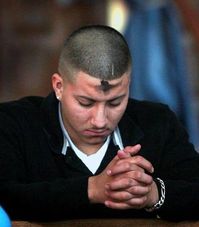 The last sentence of Pope Benedict’s Wednesday audience today gives us a clue as to the reason why we begin a religious season of conversion, a yearly season of purification, he says: “40 days of intense prayer and sincere penance, to be able to celebrate, purified and completely renewed in mind and spirit, the great mystery of her Son’s Easter.” This is the point of ashes, penance, prayer, fasting, alms-giving–Easter!
The last sentence of Pope Benedict’s Wednesday audience today gives us a clue as to the reason why we begin a religious season of conversion, a yearly season of purification, he says: “40 days of intense prayer and sincere penance, to be able to celebrate, purified and completely renewed in mind and spirit, the great mystery of her Son’s Easter.” This is the point of ashes, penance, prayer, fasting, alms-giving–Easter!
NYC churches, as one example of a large urban center, seemingly have millions of people filtering through the churches on Ash Wednesday. Certainly, the Cathedral of Saint Patrick saw 40-50 thousand people today and Saint Agnes Church saw about 7 thousand people come for ashes. It’s tiresome to stand all day imposing ashes on gizilions of people repeating person-after-person the formula, “Remember that you are dust and dust you shall return.” BUT it was good work for the Lord and for our sisters and brothers. On a personal note, I prayed my rosary and made my morning offering today for all the people upon whom I placed some ash as a token of the journey of conversion they’ve begun today by moving to the Last Supper, calvary and then unto empty tomb unto their salvation.
The Pope’s homily today is another wonderful piece of practical theology moving us to the center of faith in Jesus Christ.
Today, Ash Wednesday, we begin the Lenten journey: a journey that extends over 40 days and that leads us to the joy of the Lord’s Easter. We are not alone in this spiritual itinerary, because the Church accompanies and sustains us from the start with the Word of God, which encloses a program of spiritual life and penitential commitment, and with the grace of the sacraments.
The words of the Apostle Paul offer us a precise instruction: “Working together, then, we appeal to you not to receive the grace of God in vain. For he says: ‘In an acceptable time I heard you, and on the day of salvation I helped you.’ Behold, now is a very acceptable time; behold, now is the day of salvation” (2 Corinthians 6:1-2). In fact, in the Christian vision of life every moment must be called favorable and every day must be called the day of salvation. But the liturgy of the Church refers these words in a very particular way to the time of Lent. And that the 40 days of preparation for Easter be a favorable time and grace we can understand precisely in the call that the austere rite of the imposition of ashes addresses to us and which is expressed, in the liturgy, with two formulae: “Repent and believe in the Gospel,” and “Remember man that thou art dust and unto dust thou shalt return.”
The first call is to conversion, a word that must be taken in its extraordinary seriousness, discovering the amazing novelty it contains. The call to conversion, in fact, uncovers and denounces the easy superficiality that very often characterizes our way of living. To be converted means to change direction along the way of life — not for a slight adjustment, but a true and total change of direction. Conversion is to go against the current, where the “current” is a superficial lifestyle, inconsistent and illusory, which often draws us, controls us and makes us slaves of evil, or in any case prisoners of moral mediocrity. With conversion, instead, one aims to the lofty measure of Christian life; we are entrusted to the living and personal Gospel, which is Christ Jesus. His person is the final goal and the profound meaning of conversion; he is the way which we are called to follow in life, allowing ourselves to be illumined by his light and sustained by his strength that moves our steps. In this way conversion manifests its most splendid and fascinating face: It is not a simple moral decision to rectify our conduct of life, but it is a decision of faith, which involves us wholly in profound communion with the living and concrete person of Jesus.
To be converted and to believe in the Gospel are not two different things or in some way closely related, but rather, they express the same reality. Conversion is the total “yes” of the one who gives his own existence to the Gospel, responding freely to Christ, who first offered himself to man as Way, Truth and Life, as the one who frees and saves him. This is precisely the meaning of the first words with which, according to the Evangelist Mark, Jesus began the preaching of the “Gospel of God.” “This is the time of fulfillment. The kingdom of God is at hand. Repent, and believe in the Gospel” (Mark 1:15).
“Repent and believe in the Gospel” is not only at the beginning of the Christian life, but accompanies all its steps, [this call] remains, renewing itself, and spreads, branching out in all its expressions. Every day is a favorable moment of grace, because each day invites us to give ourselves to Jesus, to have confidence in him, to remain in him, to share his style of life, to learn from him true love, to follow him in daily fulfilling of the will of the Father, the only great law of life — every day, even when difficulties and toil, exhaustion and falls are not lacking, even when we are tempted to abandon the following of Christ and to shut ourselves in ourselves, in our egoism, without realizing the need we have to open to the love of God in Christ, to live the same logic of justice and love.
In the recent Message for Lent, I wished to remind that “humility is required to accept that I need Another to free me from ‘what is mine,’ to give me gratuitously ‘what is his.’ This happens especially in the sacraments of reconciliation and the Eucharist. Thanks to Christ’s action, we may enter into the ‘greatest’ justice, which is that of love (cf. Rm 13, 8-10), the justice that recognizes itself in every case more a debtor than a creditor, because it has received more than could ever have been expected” (L’Osservatore Romano, Feb. 5, 2010, p. 8).
The favorable moment and grace of Lent shows us the very spiritual meaning also through the old formula: “Remember man that thou art dust and unto dust thou shalt return,” which the priest pronounces when he places ashes on our head. We are thus remitted to the beginning of human history, when the Lord said to Adam after the original fault: “By the sweat of your face shall you get bread to eat, Until you return to the ground, from which you were taken; For you are dirt, and to dirt you shall return” (Genesis 3:19).
Here, the Word of God reminds us of our frailty, including our death, which is the extreme expression of our frailty. In face of the innate fear of the end, and even more so in the context of a culture that in so many ways tends to censure the reality and the human experience of dying, the Lenten liturgy on one hand reminds us of death, inviting us to realism and to wisdom but, on the other hand, it drives us above all to accept and live the unexpected novelty that the Christian faith liberates us from the reality of death itself.
Man is dust and to dust he shall return, but he is precious dust in God’s eyes, because God created man for immortality. Thus the liturgical formula “Remember man that thou art dust and to dust thou shalt return” finds the fullness of its meaning in reference to the new Adam, Christ. The Lord Jesus also wished to freely share with every man the lot of frailty, in particular through his death on the cross; but precisely this death, full of his love for the Father and for humanity, has been the way for the glorious resurrection, through which Christ has become the source of a grace given to those who believe in him and are made participants of divine life itself. This life which will have no end is already present in the earthly phase of our existence, but will be led to fulfillment after the “resurrection of the flesh.” The little gesture of the imposition of ashes reveals to us the singular richness of its meaning: It is an invitation to live the time of Lent as a more conscious and more intense immersion in the Paschal Mystery of Christ, in his death and resurrection, through participation in the Eucharist and in the life of charity, which stems from the Eucharist and in which it finds its fulfillment. With the imposition of ashes we renew our commitment to follow Jesus, to allow ourselves to be transformed by his Paschal Mystery, to overcome evil and do good, to have the “old man” in us die, the one linked to sin, and to have the “new man” be born, transformed by the grace of God.
Dear friends! While we hasten to undertake the austere Lenten journey, we want to invoke with particular confidence the protection and help of the Virgin Mary. May she, the first believer in Christ, be the one who accompanies us in these 40 days of intense prayer and sincere penance, to be able to celebrate, purified and completely renewed in mind and spirit, the great mystery of her Son’s Easter.
Good Lent to all!
What does conversion to Christ mean?
Conversion to Christ, believing in the Gospel,
ultimately means this: to exit the illusion of self-sufficiency in order to
discover and accept one’s own need – the need of others and God, the need of
His forgiveness and His friendship. So we understand how faith is altogether
different from a natural, good-feeling, obvious fact: humility is required to
accept that I need Another to free me from “what is mine,” to give me
gratuitously “what is His.” This happens especially in the sacraments of
Reconciliation and the Eucharist. Thanks to Christ’s action, we may enter into
the “greatest” justice, which is that of love (cf. Rm 13, 8-10), the justice
that recognises itself in every case more a debtor than a creditor, because it
has received more than could ever have been expected. Strengthened by this very
experience, the Christian is moved to contribute to creating just societies,
where all receive what is necessary to live according to the dignity proper to
the human person and where justice is enlivened by love.
How are you approaching Lent this year?
Grant, O Lord, that Thy faithful may begin the solemn days of Lent with fitting piety and may persevere therein with steadfast devotion.
It is time to “begin the time of fasting with joy, submitting ourselves to spiritual struggle” in preparing to live fully the Paschal Mystery of the Lord (His saving life, death, resurrection and Ascension). “By the solemn forty days of Lent the Church unites herself each year to the mystery of Jesus in the desert.” (Catechism of the Catholic Church 540).
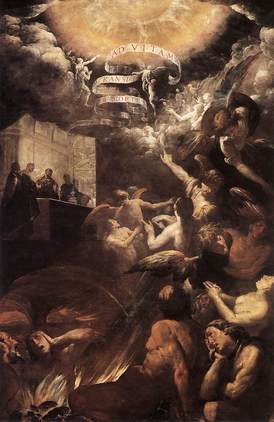 What is asked of those who make the claim to follow Christ? It seems to me that the path to understanding and living these 40 days of Lent in order to live the rest of the year as a true, honest, loving Christian. Lent, oddly enough, is a joyful time when we have a focused embrace of the spiritual struggle played out in acts of contrition, purification and prayerfulness. Often we hear Lent reduced to prayer, fasting and almsgiving. True enough, those are the hallmarks of Lent. But to broaden our sense of Lent let’s think that there is time for fasting, abstinence from certain foods, ways of thinking, acting, speaking, simple living (frugality), restriction of personal desires, intense prayer, confession of sins, and similar ascetic elements are essential to the period of Lent. Lent is a time for good work on the soul and the heart (and the body if need be). No doubt if we take Lent seriously and actually do some these spiritual works, they may be burdensome obligations or unbearable duties. We may even feel a bit despondent or dejected. The spiritual fathers and mothers all tell us that to truly follow Christ with any degree of honesty we have to work on changing our lives by conforming the self to Christ, even if it hurts. How do know how conform the self to Christ? Do lectio divina (see entry 1 and entry 2), pray the rosary, go to confession, do charitable work, spend time in silence alone in personal prayer, adore Christ in the Blessed Sacrament, and go to
What is asked of those who make the claim to follow Christ? It seems to me that the path to understanding and living these 40 days of Lent in order to live the rest of the year as a true, honest, loving Christian. Lent, oddly enough, is a joyful time when we have a focused embrace of the spiritual struggle played out in acts of contrition, purification and prayerfulness. Often we hear Lent reduced to prayer, fasting and almsgiving. True enough, those are the hallmarks of Lent. But to broaden our sense of Lent let’s think that there is time for fasting, abstinence from certain foods, ways of thinking, acting, speaking, simple living (frugality), restriction of personal desires, intense prayer, confession of sins, and similar ascetic elements are essential to the period of Lent. Lent is a time for good work on the soul and the heart (and the body if need be). No doubt if we take Lent seriously and actually do some these spiritual works, they may be burdensome obligations or unbearable duties. We may even feel a bit despondent or dejected. The spiritual fathers and mothers all tell us that to truly follow Christ with any degree of honesty we have to work on changing our lives by conforming the self to Christ, even if it hurts. How do know how conform the self to Christ? Do lectio divina (see entry 1 and entry 2), pray the rosary, go to confession, do charitable work, spend time in silence alone in personal prayer, adore Christ in the Blessed Sacrament, and go to
The liturgical season of Lent is 40 days -not a long period of spiritual training–and it ought to be regarded as an invaluable and divine gift from a God who loves us and wants us to be in relationship with Him. It is a sacred time of divine grace, which seeks to detach us from things material, lowly and corrupt in order to attract us toward things superior, wholesome and spiritual (see Catechism 1434-9). As one Christian leader said, “Lent is a unique opportunity to remove from the soul every passion, to rid the body of everything superfluous, harmful and mortal. Accordingly, then, it is a time of immense rejoicing and gladness. Lent is a genuine feast and time for exhilaration!”
Fasting expected of us by the Church, as well as the abstinence, frugality, restriction of personal desires and unnecessary pleasures or expenses, literally constitute a prescription for salvation. This is especially true this year, when our world has experienced a global economic crisis, filled with imminent danger of bankruptcy not only for individuals and companies, skyrocketing unemployment, the creation of entire hosts of people plagued by poverty, nihilism, depression, crime, and other societal ills. Lent is an education that labors to instruct us in a particular daily journey with not a great sense of “success,” without the arrogance and entitlement of extravagance, waste and bravado. It encourages us to surrender all forms of greed and ignore the challenges of commercial advertising, which constantly promotes new and false necessities (see Catechism 1430-3).
The Lenten season provokes us to limit ourselves to what is absolutely essential and necessary in an attitude of dignified, deliberate simplicity. Christian leaders advise us not to be a consuming or compulsive herd of thoughtless and heartless individuals, but a culture of sensitive and caring persons, sharing with and supporting our “neighbor” that is in poverty or recession. Finally, Lent informs us about patience and tolerance in moments of smaller or larger deprivation, while simultaneously emphasizing the need to seek God’s assistance and mercy, placing our complete trust in His affectionate providence.
That is how Christ envisions Lent. That is how the saints lived Lent. This is how the Church Fathers undertakes the struggle of Lent. This is how our faith has traditionally understood Great Lent. This is how the Church in
Natural moral guarantees respect for the entire created order, including the human person, Pope tells Pontifical Academy of Life
On February 14, 2010, the Holy Father spoke to the Pontifical Academy for Life. All but the introductory paragraph is noted here.
The issues that
revolve around the theme of bioethics allow us to confirm how much these
underlying questions in the first place pose the “anthropological
question.” As I state in my last encyclical letter, Caritas in Veritate:
“A particularly crucial battleground in today’s cultural struggle between
the absolutism of technology and human moral responsibility is the field of
bioethics, where the very possibility of integral human development is
radically called into question. In this most delicate and critical area, the
fundamental question asserts itself force-fully: is man the product of his own
labors or does he depend on God? Scientific discoveries in this field and the
possibilities of technological intervention seem so advanced as to force a
choice between two types of reasoning: reason open to transcendence or reason
closed within immanence” (no. 74).
Before such questions, which touch in
such a decisive manner human life in its perennial tension between immanence
and transcendence, and which have great relevance for the culture of future
generations, it is necessary to create a holistic pedagogical project that
permits us to confront these issues in a positive, balanced and constructive
vision, above all in the relationship between faith and reason. The questions
of bioethics often place the reminder of the dignity of the person in the
foreground. This dignity is a fundamental principle that the faith in Jesus
Christ crucified and risen has always defended, above all when it is ignored in
regard to the humblest and most vulnerable persons: God loves every human being
in a unique and profound way. Bioethics, like every discipline, needs a
reminder able to guarantee a consistent understanding of ethical questions
that, inevitably, emerge before possible interpretive conflicts. In such a
space a normative recall to the natural moral law presents itself. The
recognition of human dignity, in fact, as an inalienable right first finds its
basis in that law not written by human hand but inscribed by God the Creator in
the heart of man. Every juridical order is called to recognize this right as
inviolable and every single person must respect and promote it (cf. Catechism
of the Catholic Church, 1954-1960).
Without the foundational principle of human
dignity it would be difficult to find a source for the rights of the person and
the impossible to arrive at an ethical judgment if the face of the conquests of
science that intervene directly in human life. It is thus necessary to repeat
with firmness that an understanding of human dignity does not depend on
scientific progress, the gradual formation of human life or facile pietism
before exceptional situations. When respect for the dignity of the person is
invoked it is fundamental that it be complete, total and with no strings
attached, except for those of understanding oneself to be before a human life.
Of course, there is development in human life and the horizon of the
investigation of science and bioethics is open, but it must be reaffirmed that
when it is a matter of areas relating to the human being, scientists can never
think that what they have is only inanimate matter capable of manipulation in
their hands. Indeed, from the very first moment, the life of man is
characterized as “human life” and therefore always a bearer —
everywhere and despite everything — of its own dignity (cf. Congregation for
the Doctrine of the Faith, Instruction Dignitas Personae on Certain Bioethical
Questions, 5). Without this understanding, we would always be in danger of an
instrumental use of science with the inevitable consequence of easily ceding to
the arbitrary, to discrimination and to the strongest economic
interest.
Joining bioethics and natural moral law permits the best confirmation
of the necessary and unavoidable reminder of the dignity that human life
intrinsically possesses from its first instant to its natural end. But in the
contemporary context, while a just reminder about the rights that guarantee
dignity to the person is emerging with ever greater insistence, one notes that
such rights are not always recognized in the natural development of human life
and in the stages of its greatest fragility. A similar contradiction makes
evident the task to be assumed in different spheres of society and culture to
ensure that human life always be seen as the inalienable subject of rights and
never as an object subjugated to the will of the strongest.
History has shown
us how dangerous and deleterious a state can be that proceeds to legislate on
questions that touch the person and society while pretending itself to be the
source and principle of ethics. Without universal principles that permit a
common denominator for the whole of humanity the danger of a relativistic drift
at the legislative level is not at all something should be underestimated (cf.
Catechism of the Catholic Church, 1959). The natural moral law, strong in its
universal character, allows us to avert such a danger and above all offers to
the legislator the guarantee for an authentic respect of both the person and the
entire created order. It is the catalyzing source of consensus among persons of
different cultures and religions and allows them to transcend their differences
since it affirms the existence of an order impressed in nature by the Creator
and recognized as an instance of true rational ethical judgment to pursue good
and avoid evil. The natural moral law “belongs to the great heritage of
human wisdom. Revelation, with its light, has contributed to further purifying
and developing it” (John Paul II, Address to the Plenary Assembly of the
Congregation of the Doctrine of the Faith, February 6, 2004).
Illustrious
members of the Pontifical Academy for Life, in the present context your task
appears more and more delicate and difficult, but the growing sensitivity in
regard to human life is an encouragement to continue, with ever greater spirit
and courage, in this important service to life and the education of future
generations in the evangelical values. I hope that all of you will continue to
study and research so that the work of promoting and defending life be ever
more effective and fruitful. I accompany you with the apostolic blessing, which
I gladly extend to those who share this daily task with you.
Sin is in opposition to God’s infinite holiness
I went to confession the other day. I try to go once a month and for the most part I make that commitment. For some reason, it was a about 8 weeks since I darkened the confessional. I was leaving that afternoon for my hermitage day (spoken of in another blog post below) and Lent was fast approaching. Going to confession was awkward, lonely, fearful BUT intensely gratifying, freeing, and loving. Facing one’s sinful nature is NEVER easy; it is NEVER anything but a hassle, it is NEVER anything but embarassing but it is the only way I know how to be honest with myself in front of God. As an Opus Dei priest tells me when I see him occasionally for confession: you’ve got sin, I’ve got the grace for you to live … by the ministry of the Church. Of course, this priest is echoing the notion that I am not confessing my sinful self to him personally (I really don’t think he cares one-way-or-another truely in the best sense) but ipse Christus –to Christ Himself. I read the passage noted below from a rather famous spiritual treatise today and the last line from sacred Scripture struck me: If anyone would come after me, let him deny himself. Do you have a clear understanding of mortal sin? Have you gone to confession? How is your struggle with sin going in the face of grace?
Only mortal sin is completely opposed to God; this opposition is so great that it separates the soul from God. However, every sin, even venial sin, and every fault and imperfection, is in opposition to God’s infinite holiness. Therefore Jesus offers the perfection of his heavenly Father as a norm for our Christian life, and engages us in an intense struggle against sin in order to destroy in us its deepest roots and even its slightest traces.
This is what Jesus teaches in these few short words: deny yourself. We must deny self with all its imperfect habits and inclinations; and we must do so continually. Such a task is fatiguing and painful, but it is indispensable if we wish to attain sanctity. Jesus says: The gate is narrow and the way is hard that leads to life, and those who find it are few (Mt.
In echo of Jesus, all the masters of the spiritual life insist strongly on detachment and self-renunciation as the indispensable foundation of the spiritual life.
But first and foremost, it is Jesus, the divine Teacher, who has pointed out to us the absolute necessity of passing through this way: If anyone would come after me, let him deny himself (Mt.
Divine Intimacy
Way of the Cross, Good Friday, 2010 –NY Communion & Liberation
Hermitage Days
 Being busy about many things affords one many distractions, which can be a good thing. Very often, being too busy and distracted offers no consolation and actually makes life less interesting, less thirsty for God, less able to hear the promptings of the Lord, less focused on substantial matters of life. Perhaps one can say less able to take serious our own reality. But life is not about measuring up to a standard as it is about a relationship, time spent in the company of the other person (though the other person be yourself).
Being busy about many things affords one many distractions, which can be a good thing. Very often, being too busy and distracted offers no consolation and actually makes life less interesting, less thirsty for God, less able to hear the promptings of the Lord, less focused on substantial matters of life. Perhaps one can say less able to take serious our own reality. But life is not about measuring up to a standard as it is about a relationship, time spent in the company of the other person (though the other person be yourself).

